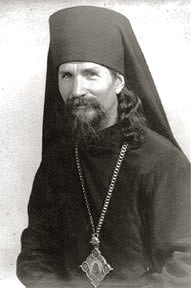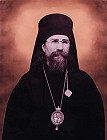
Holy Trinity Orthodox Seminary was founded in 1948 by Archbishop Vitaly (Maximenko) under the auspices of Holy Trinity Monastery, and the Seminary's life continues to be intimately interwoven with that of the Monastery. The Seminary was first established as a school for the young members of the monastic brotherhood, but thanks to the untiring efforts of its founders, Archbishop Vitaly and Dean Nicholas Alexander, the Seminary has grown into a theological school for Orthodox Christian students from all over the world. Monastery PublicationsBy maintaining a religious printing press, the Monastery fills a considerable need among the faithful. Several periodicals are printed in Russian and English, containing articles on contemporary religious issues, lives of Saints, sermons, questions of theology, etc. Both students and faculty participate in the writing, editing and printing of these magazines. Many of the students are engaged in translating articles for publication. Extended History
Only two decades after its establishment, the Russian Orthodox Church Outside of Russia began to feel the need for pastors who had a systematic theological education. Well-prepared priests, educated in the seminaries and academies of pre-Revolutionary Russia , were either retiring or passing to the better world, but those who replaced them were less well educated. This problem was addressed at the beginning of World War II with the offering of theological courses at the Monastery of St Job of Pochaev in the Carpathian Mountains and the Orthodox Theological Institute in Wroclav. But because the war dragged on, and due to the evacuation of the Synod of Bishops and its flock from the areas suddenly controlled by the Soviets, the challenge of preparing the pastors of the future became, for a time, impossible to address. Archbishop Vitaly (Maximenko) of blessed memory, after the American Metropoliate separated at the Cleveland Sobor of 1946, was very concerned about the reorganization of the parishes in North America that remained loyal to the Russian Orthodox Church Outside of Russia, and to provide clergymen for them. At the time, following the end of World War II, many refugees began to resettle in the New World, including the US. After the Cleveland Sobor, only a few parishes remained with the Church Abroad. But now immigrants began to appear who appealed to Archbishop Vitaly for blessing to open new parishes. There were priests among the Russian emigres arriving in America from Eastern Europe , whom Archbishop Vitaly appointed to the newly-established parishes. Vladyka Vitaly foresaw that the Russian Church Abroad would be faced with a shortage of clergymen to minister to the flock. For this reason he began to develop a plan to educate and train candidates to serve the Holy Church . Towards this end, Vladyka Vitaly took the following steps: at a meeting of the bishops who remained loyal to the Russian Orthodox Church Outside of Russia, during a meeting of the Diocesan Administration in New York on 15/28 June, 1948, the matter of creating a theological school was raised. At the suggestion of Archbishop Vitaly, a report by N.N. Alexandrov was heard on establishing Holy Trinity Seminary at the monastery in Jordanville. He reported on the application he made to the State of New York for permission to open a theological school. Draft rules and regulations for the seminary were also presented. The goal of the seminary was to give young people a spiritual education and good ecclesiastical training to prepare them to serve as priests. This education would include the following disciplines: theological subjects, philosophy, world and ecclesiastical history, languages, church singing, etc. The Trustees of the Seminary were Archbishop Vitaly, Archbishop Tikhon, Archbishop Ioassaf, Archbishop Ieronim, Hegumen Panteleimon, with Hegumen Iosif as the Secretary, and the monastery's "printer," Hieromonk Anthony (Yamshchikov, +1993), was the Treasurer. Its teachers were Archbishop Vitaly: Patristics and Homiletics; Bishop Seraphim (Ivanov): Dogmatic Theology and Liturgics; Protopriest V. Demidov: Apologetical Theology and Church History; Bishop Nikon (Rklitsky): Moral and Pastoral Theology; Hegumen Iosif: Church Music; Hieromonk Kyprian (Pyzhov): Church Art. Alexandrov's plan, in which he is named Dean of the Seminary, included other subjects and languages as well. Having heard the report and discussing it in detail, the bishops at the meeting decreed: "Starting the new school year on October 1/14, 1948, to establish Holy Trinity Seminary at Holy Trinity Monastery; "To appoint His Grace Bishop Seraphim as President of the Seminary; "To appoint Dr NN Alexandrov (Professor of Rhode Island State College) as Vice President, with the task of legalizing and effect the opening of the Seminary. "To confirm the staff of teachers listed in the Seminary Regulations." Professor Alexanderov immediately began applying for permission from the State of New York to open the Seminary. On July 16, 1948, he received authorization from the State Board of Education to establish the Seminary, with the caveat that "the goal for which this corporation is established is to create a seminary to educate young people to serve as white and black clergymen for the Russian Orthodox Church in America ." Archbishop Vitaly sent a report to Metropolitan Anastassy in Munich , in which he briefly mentions the measures taken to open the Seminary, listing the officers of the corporation, the teachers and subjects scheduled for the first year. Metropolitan Anastassy replied via telegram: "The Synod of Bishops blessed the opening of the Seminary. Metropolitan Anastassy." Then an ukase was issued by the Synod of Bishops of September 22/October 12, 1948, stating: "Decreed: to confirm the establishment of Holy Trinity Seminary in Jordanville in accordance with the proposal presented, and to bless the commencement of the first semester beginning on October 1/14, 1948," So, with God's help, on the day of the Protection of the Most-Holy Mother of God in 1948, a moleben was served before the beginning of studies, and the following day, regular classes began. There were seven students enrolled the first semester, and nine the second. The year ended on the feast day of SS Cyril and Methodius in May, 1949. There were a total of 28 weeks of study and 15 hours of classes per week. Starting with the second semester of 1948-49, the Seminary Rector was Archbishop Vitaly, and Bishop Seraphim was relieved of his duties at the Seminary. ND Talberg acutely called the Seminary the child of Archbishop Vitaly. But Vladyka found it difficult to find time for his Rectorship and the operation of a large diocese, and being Abbot of Holy Trinity Monastery, so in 1951, he invited Archimandrite Averky (Taushev) from Munich , who, after a year of teaching in 1952, was confirmed by the Synod of Bishops as the Seminary Rector. In 1953, Archimandrite Averky was consecrated to the episcopacy, and, heading both the Diocese and Monastery from 1960 on, was also the Seminary Rector until his death in 1976. After his death, his protege, Bishop Laurus (Shkurla) of Manhattan , himself a graduate of the Seminary's class of 1954, became Rector. Over the course of many years, Vladyka Laurus taught Dogmatic Theology and Canonical Law at the Seminary. Becoming the First Hierarch of the Russian Orthodox Church Outside of Russia, His Eminence Metropolitan Laurus continues to this day to be the Seminary Rector. Through his efforts, Holy Trinity Seminary celebrated its 50 th anniversary in 1998, and has in recent years organized a series of scholarly conferences. It is important to remember the Seminary's deans, who worked towards preparing a whole generation of clergymen for the Russian diaspora—Professor Alexandrov, who established the curriculum and administration of the Seminary; EE Alferov, a magnificent historian and true expert of the life and work of Holy Royal Martyr Tsar Nicholas II; and EI Klar. The Seminary teachers also deserve credit: Archimandrite Konstantin (Zaitsev), Protopresbyter Michael Pomazansky, ND Talberg, IM Andreevsky and many others. Many earned praise for their educational work not only throughout the Russian diaspora, but became teachers of the Word of God for many Orthodox people in their historical Homeland, Russia . For over 70 years, the Seminary's more than 300 graduates received a Bachelor's Degree in Theology (The M.Div. program was launched in 2018). Many became servants of the Church of Christ, from Metropolitan to layman. The words spoken to the seminarians by Archimandrite Averky more than 40 years ago serve a sort of testament: "Our common duty is to remember that Holy Trinity Seminary, is our only religious school; but also that to some degree, depending on it are the future of our Russian Orthodox Church Outside of Russia, our much-suffering Russian people scattered throughout the world, our Homeland itself, which will be in such need of true, well-prepared pastors, if God allows us to return; moreover, I make bold to say the following: the future of all mankind depends on it, since its fate, as we clearly see now, is in fact and mysteriously closely-bound, to the fate of our Homeland." *History from synod.com |
History

Holy Trinity Orthodox Seminary
PO Box 36; Jordanville, NY 13361
1407 Robinson Road, Jordanville, NY 13361
info@hts.edu
315-858-0945 (Phone)
315-409-1422 (Fax)


